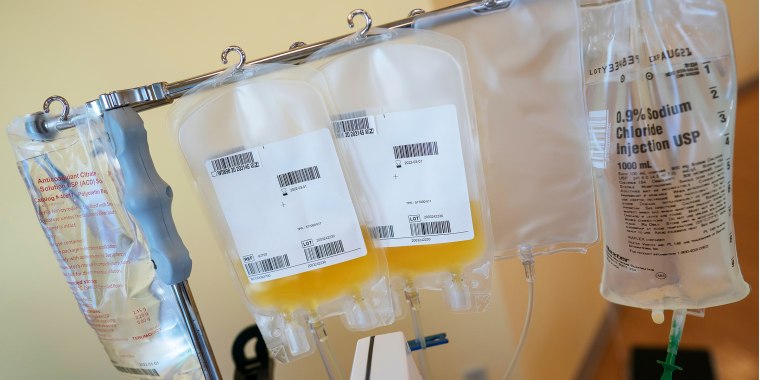Calling all recovered COVID-19 patients to help other people still actively fighting the virus.
The American Red Cross this week announced it's facing an "emergency shortage" of convalescent plasma, the liquid portion of blood taken from survivors. It's rich in antibodies that may speed up recovery for the sickest patients.
Since late June, the agency has seen hospital demand for convalescent plasma more than double as coronavirus cases rose in many states, so it's distributing the products faster than donations are coming in, it said Wednesday.
"It is critical that COVID-19 survivors give their antibody-rich plasma now to ensure this blood product is available to help those actively battling this coronavirus," said Dr. Pampee Young, chief medical officer of American Red Cross Biomedical Services, in a statement.
Convalescent plasma "remains crucially important" during this pandemic, she added. People can sign up by completing the Red Cross' donor information form. Each plasma donation can potentially help treat up to three patients, so COVID-19 survivors have a unique ability to help, the agency noted.
The main difference from regular blood donation is the time required. It takes about 10 minutes to give whole blood, but up to two hours to collect plasma, which is done using a technology called apheresis.
Blood drawn from an arm is sent through a machine that spins it to separate the components. The plasma portion then collects in a bag, while the red cells and platelets are returned to the donor.
People who have not had COVID-19 can still help by scheduling a regular blood donation to ensure a stable blood supply during the pandemic.
As of July, almost 40,000 blood drives have been cancelled since March due to the crisis, resulting in over 1 million blood donations going uncollected, said Stephanie Rendon, a spokeswoman for the American Red Cross.
"This is especially concerning since many hospitals have begun to resume surgical procedures and patient treatments that require blood transfusions, causing an increase in demand for blood products during this rapidly changing and complex public health crisis," she said.
Download the TODAY app for the latest coverage on the coronavirus outbreak.
As the pandemic began, donors began dropping out because of fears about being in close contact with other people or were prevented from coming by new rules about who can enter buildings and facilities. Yet the need for blood never goes down.
Donating blood is safe and doesn’t harm a person’s immune system or health, and there’s no data that COVID-19 or any respiratory viruses can be transmitted via blood transfusion, Young said. The U.S. Food and Drug Administration has also eased restrictions on gay blood donors.
Stronger donation safety protocols in place:
The Red Cross collects blood only from people who are healthy and feeling well at the time of donation, and who meet other eligibility requirements. It's also currently testing all blood, platelet and plasma donations for COVID-19 antibodies as an additional service for donors.
The organization said its employees are taking additional safety measures, including:
- Wearing gloves and changing them often
- Wearing face masks
- Wiping down donor-touched areas after every collection
- Conducting temperature checks before potential donors enter the blood drive
- Providing hand sanitizer for donors to use before entering and throughout the appointment
- Using sterile collection sets for every donation
- Preparing the arm for donation with aseptic scrub
- Conducting "mini-physicals" to ensure donors are healthy
- Conducting enhanced disinfecting of surfaces and equipment
- Following social distancing practices between donors, including waiting areas and donor beds
The organization is telling potential donors who may have any risk factors — like international travel and exposure to an infected person — to give blood at a later time.
People who want to donate blood can make an appointment by using the Red Cross Blood Donor App, visiting RedCrossBlood.org or calling 1-800-RED CROSS (1-800-733-2767).
“The last thing a patient should worry about is whether lifesaving blood will be on the shelf when they need it most,” said Chris Hrouda, president of Red Cross Blood Services, in a statement.


